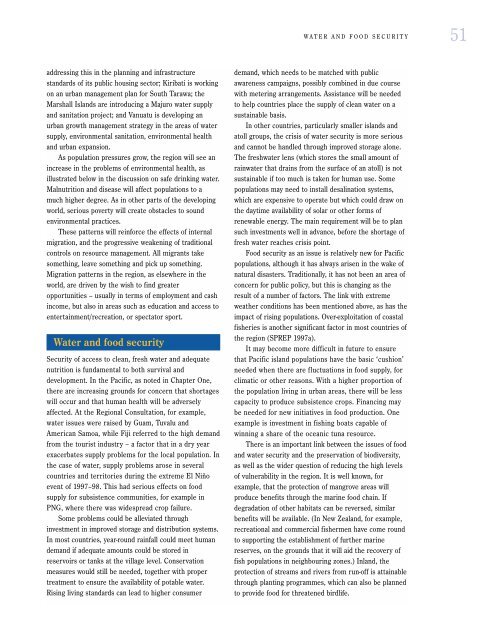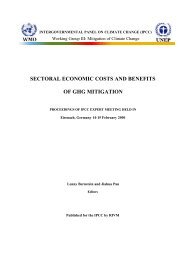Pacific Islands Environment Outlook - UNEP
Pacific Islands Environment Outlook - UNEP
Pacific Islands Environment Outlook - UNEP
You also want an ePaper? Increase the reach of your titles
YUMPU automatically turns print PDFs into web optimized ePapers that Google loves.
WATER AND FOOD SECURITY<br />
51<br />
addressing this in the planning and infrastructure<br />
standards of its public housing sector; Kiribati is working<br />
on an urban management plan for South Tarawa; the<br />
Marshall <strong>Islands</strong> are introducing a Majuro water supply<br />
and sanitation project; and Vanuatu is developing an<br />
urban growth management strategy in the areas of water<br />
supply, environmental sanitation, environmental health<br />
and urban expansion.<br />
As population pressures grow, the region will see an<br />
increase in the problems of environmental health, as<br />
illustrated below in the discussion on safe drinking water.<br />
Malnutrition and disease will affect populations to a<br />
much higher degree. As in other parts of the developing<br />
world, serious poverty will create obstacles to sound<br />
environmental practices.<br />
These patterns will reinforce the effects of internal<br />
migration, and the progressive weakening of traditional<br />
controls on resource management. All migrants take<br />
something, leave something and pick up something.<br />
Migration patterns in the region, as elsewhere in the<br />
world, are driven by the wish to find greater<br />
opportunities – usually in terms of employment and cash<br />
income, but also in areas such as education and access to<br />
entertainment/recreation, or spectator sport.<br />
Water and food security<br />
Security of access to clean, fresh water and adequate<br />
nutrition is fundamental to both survival and<br />
development. In the <strong>Pacific</strong>, as noted in Chapter One,<br />
there are increasing grounds for concern that shortages<br />
will occur and that human health will be adversely<br />
affected. At the Regional Consultation, for example,<br />
water issues were raised by Guam, Tuvalu and<br />
American Samoa, while Fiji referred to the high demand<br />
from the tourist industry – a factor that in a dry year<br />
exacerbates supply problems for the local population. In<br />
the case of water, supply problems arose in several<br />
countries and territories during the extreme El Niño<br />
event of 1997–98. This had serious effects on food<br />
supply for subsistence communities, for example in<br />
PNG, where there was widespread crop failure.<br />
Some problems could be alleviated through<br />
investment in improved storage and distribution systems.<br />
In most countries, year-round rainfall could meet human<br />
demand if adequate amounts could be stored in<br />
reservoirs or tanks at the village level. Conservation<br />
measures would still be needed, together with proper<br />
treatment to ensure the availability of potable water.<br />
Rising living standards can lead to higher consumer<br />
demand, which needs to be matched with public<br />
awareness campaigns, possibly combined in due course<br />
with metering arrangements. Assistance will be needed<br />
to help countries place the supply of clean water on a<br />
sustainable basis.<br />
In other countries, particularly smaller islands and<br />
atoll groups, the crisis of water security is more serious<br />
and cannot be handled through improved storage alone.<br />
The freshwater lens (which stores the small amount of<br />
rainwater that drains from the surface of an atoll) is not<br />
sustainable if too much is taken for human use. Some<br />
populations may need to install desalination systems,<br />
which are expensive to operate but which could draw on<br />
the daytime availability of solar or other forms of<br />
renewable energy. The main requirement will be to plan<br />
such investments well in advance, before the shortage of<br />
fresh water reaches crisis point.<br />
Food security as an issue is relatively new for <strong>Pacific</strong><br />
populations, although it has always arisen in the wake of<br />
natural disasters. Traditionally, it has not been an area of<br />
concern for public policy, but this is changing as the<br />
result of a number of factors. The link with extreme<br />
weather conditions has been mentioned above, as has the<br />
impact of rising populations. Over-exploitation of coastal<br />
fisheries is another significant factor in most countries of<br />
the region (SPREP 1997a).<br />
It may become more difficult in future to ensure<br />
that <strong>Pacific</strong> island populations have the basic ‘cushion’<br />
needed when there are fluctuations in food supply, for<br />
climatic or other reasons. With a higher proportion of<br />
the population living in urban areas, there will be less<br />
capacity to produce subsistence crops. Financing may<br />
be needed for new initiatives in food production. One<br />
example is investment in fishing boats capable of<br />
winning a share of the oceanic tuna resource.<br />
There is an important link between the issues of food<br />
and water security and the preservation of biodiversity,<br />
as well as the wider question of reducing the high levels<br />
of vulnerability in the region. It is well known, for<br />
example, that the protection of mangrove areas will<br />
produce benefits through the marine food chain. If<br />
degradation of other habitats can be reversed, similar<br />
benefits will be available. (In New Zealand, for example,<br />
recreational and commercial fishermen have come round<br />
to supporting the establishment of further marine<br />
reserves, on the grounds that it will aid the recovery of<br />
fish populations in neighbouring zones.) Inland, the<br />
protection of streams and rivers from run-off is attainable<br />
through planting programmes, which can also be planned<br />
to provide food for threatened birdlife.

















